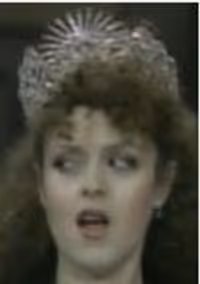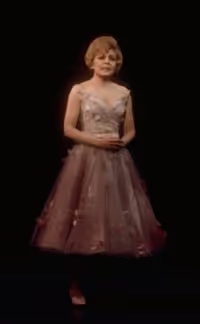Sondheim's weaker lyrics/rhymes
#175Sondheim's weaker lyrics/rhymes
Posted: 1/3/14 at 10:56pm
I (probably) is simply because I am so used to the original lyrics, but re the Now You Know change (and I won't even get into dropping the lumpy cream of wheat reference which I always liked)... For me the lyric doesn't sit as well on the music. "Bricks can tumble from clear blue skies" is a different emphasis when sung than the staccato "Bricks can fall outa clear blue skies" which sits on all the notes. I guess he wanted the change... It does put more emphasis on the word tumble than fall outa had, I guess...
But frankly, I rarely don't like the changes made to a piece once it's been initially frozen. Merrily is a special case--I miss many original elements and it was a flop, but I certainly wouldn't have bothered changing the lyrics to Now You Know. But, as I've mentioned, I also tend to dislike the revisions Tennessee Williams always made to his plays with each new published edition (or full on re-writes--there's a great Blythe Danner performance in the PBS filmed version of The Eccentricities of A Nightingale, but Summer and Smoke is a more powerful play even if ITS film de-emphasized parts I really prefer in the script.)
I suppose if I knew more about the different folios of SHakespeare's plays I would know if I thought later published versions seemed more complete, though of course that's a different situation where it seems that the various versions came out of changes actors and made (or whoever was writing it down) and not him.
#176Sondheim's weaker lyrics/rhymes
Posted: 1/3/14 at 11:13pmI vastly prefer "I mean even Cream of Wheat has lumps."
bk
Broadway Legend Joined: 7/20/03
#177Sondheim's weaker lyrics/rhymes
Posted: 1/4/14 at 2:26am
"“Some people can get a thrill
Knitting sweaters and sitting still
That's okay for some people
Who don't know they're alive
Some people can thrive and bloom
Living life in a living room
That's perfect for some people
Content just to survive”
Anyone, and I mean anyone, who thinks the substituted line is better than the original is, well, is just an amateur. "Content just to survive"??? Really? Colorless, boring and certainly not Rose. Most of the lyrics quoted in this thread could not be bettered by anyone, let alone a bunch of people on a message board. Really. I don't love everything Mr. Sondheim has written, I don't love everything anyone has written, but I would not come on a message board and post what I've read here. But, that's just me. "Content just to survive." Horrifying. Steve, if you're reading this thread, forgive them, for they know not what they do.
#178Sondheim's weaker lyrics/rhymes
Posted: 1/4/14 at 3:17amFor the most part, I don't see people here saying they could come up with better lyrics--just personal things that bug them. *shrug* Growlers, who I believe suggested that line, certainly never claimed to be anything but, as you say, an amateur...
#179Sondheim's weaker lyrics/rhymes
Posted: 1/4/14 at 7:34amWhen it comes to Sondheim's work I think lyric writing is he medium. He is a very strong lyricist where he falls short allot of the time, for me, is in his music. He has a stye that he uses ,just like every other composer, and his is just not one that I can get into 75% of the time.
#180Sondheim's weaker lyrics/rhymes
Posted: 1/4/14 at 7:12pm
And I think he's our most gifted composer since Richard Rodgers. I freely admit it took me longer to appreciate his "book songs" (as opposed to the pastiche numbers), but once I did, I haven't looked back.
"Anyone, and I mean anyone, who thinks the substituted line is better than the original is, well, is just an amateur."
I wouldn't throw the word "amateur" around (even professionals disagree at times), but I agree that "content just to survive" is an inferior line. "Who don't know they're alive.../Content just to survive" are essentially synonyms and use of the latter doesn't advance Rose's argument.
On the other hand, "Who don't know they're alive…" means willfully or stupidly comatose while "some people/of one hundred and five" means nearly physically dead, which is a slight step forward in Rose's rant.
The range a character can travel in one lyric is often limited. Why deprive Rose of this baby step?
#181Sondheim's weaker lyrics/rhymes
Posted: 1/4/14 at 7:47pmHe does have a musical style it's just not an ascetic that I care for. I wouldn't by any means make him only second to RR though. To me that speaks of one that that feels he can do no wrong. I'd be more likely to put Jerry Herman and Frederick Loewe more in that category. You never really hear much of a ton of orchestras and symphonies doing a Sondheim even sans lyrics for a reason.
#182Sondheim's weaker lyrics/rhymes
Posted: 1/4/14 at 8:11pm
"When it comes to Sondheim's work I think lyric writing is he medium. He is a very strong lyricist where he falls short allot of the time, for me, is in his music. He has a stye that he uses ,just like every other composer, and his is just not one that I can get into 75% of the time. "
Right, and as you point out that's a personal reaction/preference (which I suspect to "more people than not" is true of music and less true with lyrics--it's easier for us "amateurs" to justify a lyric working or not rather than the reasons some music works better for us.)
I admit the criticism about how he's an amazing lyricist and just a so/so composer (which was much more common--if reading older books and reviews can be believed--in the 60s and 70s it almost seemed like an easy excuse critics would use to explain why they didn't get the upcoming Sondheim fan[atics]) still bothers me but only because I actually connect ot his works MORE from the music than from the lyrics. That's hard to fully justify--he's written so little music to other people's lyrics--but what does stick with me with his works or randomly pops up in my head tend to be musical moments rather than lyrical.
#183Sondheim's weaker lyrics/rhymes
Posted: 1/4/14 at 8:17pm
"You never really hear much of a ton of orchestras and symphonies doing a Sondheim even sans lyrics for a reason. "
I get your point, but I'm gonna argue this line. The main reason, IMHO, is because symphonies tend to have to base some of their repertoire on well known audience favourites. When an orchestra does a "Pops" style concert--be it favorite 40s and 50s standards, or familiar John Williams pieces--Hell even the recent phenomenon of that tour of popular video game music--it's almost always largely to help sustain them financially. That sounds cynical, but especially when orchestras find their audiences dwindling, they can rely on their older audience who can afford and want subscriptions on being happy to hear a program made up of at least 2/3rds 19th century romantic favorites, throw in a Rodgers and Hammerstein tribute, etc, and then maybe try to appeal to a youngr audience who don't have the orchestra on their radar with a concert of recent movie or, like I said, video game favorites.
Andrew Lloyd Webber gets thrown in there too, but otherwise I'd wager next to no post 1970s Broadway stuff does. That said, you ARE starting to see more Sondheim songs pop up in those types of programs, as you are starting to see more jazz versions of his music.
#184Sondheim's weaker lyrics/rhymes
Posted: 1/4/14 at 9:14pm
There's a reason almost every Sondheim musical has been re-released as a "complete music" recording--and it ain't the lyrics (which by and large are complete in the OBCR).
But minimalism isn't to everyone's taste, metropolis. I can agree to disagree here with no disrespect.
***
Eric, your research of critical reaction to Sondheim in the early 1970s is exactly right: "our greatest lyricist/so-so composer". But that was 40 years ago. And while Loewe and Herman were also great, they were more similar to what theatergoers were used to hearing. It took a number of shows for everyone (except you-know-who) to get used to Sondheim. (And it didn't help that he periodically produces works like PACIFIC OVERTURES or PASSION which many people find "odd".)
But I will repeat: I think Sondheim is every bit as great a composer as he is a lyricist, particularly when one thinks of him as a theater composer. (Even he will admit he doesn't write pop hits.)
After Eight
Broadway Legend Joined: 6/5/09
#185Sondheim's weaker lyrics/rhymes
Posted: 1/4/14 at 10:13pm
"I think Sondheim is every bit as great a composer as he is a lyricist,"
Or as lousy.
"It took a number of shows for everyone (except you-know-who) to get used to Sondheim"
Except no one has. Other than eliist snobs here, there, and everywhere who foist such hogwash upon us.
Updated On: 1/4/14 at 10:13 PM
#186Sondheim's weaker lyrics/rhymes
Posted: 1/4/14 at 10:25pm
A8, if once--just once--you provided some objective support for your irrational hatred of Sondheim, someone might take you seriously. Even Sondheim detractors--or at least the rest of them--acknowledge his skill with the English language.
I get that you like musicals about puppies and rainbows, but that isn't Sondheim's worldview and there's no reason he should write what he doesn't believe.
***
By "elitist snobs" I suppose you mean all the middle school, high school and college students who have performed INTO THE WOODS.
When I was teaching, my students produced three different productions of ASSASSINS and several of WOODS. This they did on their own, not because some elite snob forced them to do so.
Updated On: 1/4/14 at 10:25 PM
After Eight
Broadway Legend Joined: 6/5/09
#187Sondheim's weaker lyrics/rhymes
Posted: 1/4/14 at 10:54pm
I don't hate Sondheim's work, or even his adulators. I find them both simply tiresome and mildly irritating.
What I don't like is when people try to pass off hogwash as the truth.
I've offered countless examples of "objective" support for my assertions, as evidenced in this very thread. Don't blame me if you, and others like you, refuse to hear what you don't want to hear.
Skill with the English language does not equate to being a great lyricist.
"When I was teaching, my students produced three different productions of ASSASSINS and several of WOODS. This they did on their own, not because some elite snob forced them to do so"
Decades of relentless indoctrination by elitist snobs certainly gets results, doesn't it?
Updated On: 1/4/14 at 10:54 PM
#188Sondheim's weaker lyrics/rhymes
Posted: 1/4/14 at 11:12pm
A couple of years ago I didn't care for musicals at all. I had heard some of the most popular musicals (e.g., Some Rodgers & Hammerstein, some ALW etc). When the Sweeney Todd movie came out I listened to the film soundtrack and OBCR not knowing anything about - I was amazed how well music could tell the story - AMAZED. I found out the composer was Stephen Sondheim and had a similar experience with many of his other musicals. His work is what really made me 'get into' musicals. It is rare that I get this same experience with other musicals today. I think from my story we can conclude a couple of things (at least in my case):
* It was Sondheim's music, not lyrics that drew me to him. So I personally don't think for a second he is a better lyricist than a composer.
* I didn't have any elist snobs telling me to enjoy his work or 'indoctrinate' me. In fact, I don't work or study in any related field to musicals or theatre. It's purely just out of interest for me - I didn't care for musicals at all until his work drew me to them.
- Further to this point, the fact that in my experience Sondheim fans are more educated (I don't necessarily mean in musical theatre, but in general) and more versed in musical theatre is just validation to me that there is something special about his work.
After Eight
Broadway Legend Joined: 6/5/09
#189Sondheim's weaker lyrics/rhymes
Posted: 1/4/14 at 11:24pm
"the fact that in my experience Sondheim fans are more educated"
I'm afraid then that your experience is extremely limited.
#190Sondheim's weaker lyrics/rhymes
Posted: 1/4/14 at 11:59pm
"Decades of relentless indoctrination by elitist snobs certainly gets results, doesn't it? "
I'm confused. The average student certainly has not gone through decades of indoctrination into anything.
#191Sondheim's weaker lyrics/rhymes
Posted: 1/5/14 at 12:05amAfterEight, your snobbery confuses me. You blame any love of Sondheim on someone being an elitist snob, yet in many of the same discussions you have criticized the same people for enjoying something which nobody would classify as elitist. (Like when you claimed, because I initially didn't recognize a Proust line you paraphrased, and then said I should stick to things like The Hunger Games--a series I've never been a big fan of, but I wouldn't think less of someone who was.) You claim proof of Sondheim being poor stuff by saying he's not popular except with his snobby fans, and yet nearly everything you see as a superior alternative has not been popular for years, and often has had no afterlife post their initial productions.
After Eight
Broadway Legend Joined: 6/5/09
#192Sondheim's weaker lyrics/rhymes
Posted: 1/5/14 at 5:37am
Eric,
The average student is exposed to the RESULTS of decades of relentless indoctrination, where repeated falsehoods are now presented and accepted as the given truth.
"AfterEight, your snobbery confuses me."
I dare say it does, for the simple reason that I'm not a snob! I'm acceptably educated and cultured. That's a whole different story.
".and yet nearly everything you see as a superior alternative has not been popular for years, and often has had no afterlife post their initial productions."
You can thank the media elitists for that, who've done everything they can to make sure the publc is deprived of anything that brings them joy. Sondheim's work certainly fills that bill nicely, doesn't it!
Updated On: 1/5/14 at 05:37 AM
#193Sondheim's weaker lyrics/rhymes
Posted: 1/5/14 at 10:14am
It must be a plot.
'Cause they're scared that I got
Such a gift!
Well, I'm miffed...
#194Sondheim's weaker lyrics/rhymes
Posted: 1/5/14 at 6:27pmPalJoey, can I just say I Love You?
#195Sondheim's weaker lyrics/rhymes
Posted: 1/5/14 at 6:39pm
After Eight, saying Sondheim is awful and everything written before 1969 was "wonderful" is not supporting your argument, it's merely repeating it.
Updated On: 1/5/14 at 06:39 PM
#196Sondheim's weaker lyrics/rhymes
Posted: 1/5/14 at 6:42pm
Gaveston,
I love the 3 "careers" in that line! She's made a career out of careering from job to job.
Again, I get it. But would Carlotta say it?
This is not a world crisis to me. I love the song and the show is my favorite. But I thought we were asked for lyrics where we pull back and think, "Oh, the lyricist is being clever."
"Then I careered from career to career" was such a line for me.
Updated On: 1/5/14 at 06:42 PM
#197Sondheim's weaker lyrics/rhymes
Posted: 1/12/14 at 9:32am
One that has always annoyed me is from Merrily. "These are the movers / These are the shapers / These are the people / That fill the papers."
I always felt the use of the word "shapers" was off. The classic term is "movers and shakers" I always wonder if Sondheim changed it to "shapers" in order to get the rhyme with "papers". Movers and shapers works technically and makes sense, technically. But its closeness to such a classic, well known phrase makes it feel wonky to me. Maybe Sondheim intended it as having no relation to "movers and shakers" or maybe he made a weak alternative version of the phrase to fit a rhyme. Either way, it takes me out of the song every time. So in my estimation, it fails.
I'm a staunch admirer of SJS and feel, for the most part he exceeds perfection. But there are some very occasional moments when I'm not buying what he's selling. This is one.
#198Sondheim's weaker lyrics/rhymes
Posted: 1/12/14 at 10:03am
OK, After Eight here goes:
"Too busy to know that they're fools."
No, they are not. "
Some are. Some aren't. Joanne, in the moment, reflects that they are. Joanne is, if you haven't noticed, ****faced.
"No Place Like London." Repugnant lyrics, repugnant show."
Fine lyrics, masterpiece show.
"day after day after day after day......."
Oh please, must you bludgeon us with the same banality from here to eternity?"
Please do, if its in character and is exactly the emotion being experienced by that character.
"You're always sorry, You're always grateful."
Wow, what profound insight, so brilliantly expressed!"
Actually it is profound, because it's absolutely correct about how many feel about their mates, and is precisely what Harry is thinking when Robert asks him if he's ever sorry he got married.
Updated On: 1/12/14 at 10:03 AM
#199Sondheim's weaker lyrics/rhymes
Posted: 1/12/14 at 10:27am
Not to mention that the reversals in the lyric to "Sorry Grateful" ("Regretful/happy"; "You hold her thinking 'I'm not alone'; / You're still alone") have their roots in classical rhetoric. Reversals of meaning have been used by everyone from Greek philosophers, who called it "chiasmus" and "antimetabole," to Dickens ("It was the best of times; it was the worst of times") to Shakespeare ("To be or not to be, that is the question") to Mae West ("It's not the men in my life that count; it's the life in my men") to Dr. Seuss ("I meant what I said and I said what I meant") to JFK "("Ask not what your country can do for you; ask, rather, what you can do for your country.")
So to say that the reversal of "You're always sorry; you're always grateful" is banal--when it clearly expresses an ambivalence very common in long-term relationships--is as silly as this old New Yorker cartoon, berating Charles Dickens, like Poor Jenny," for "not being able to make up his mind":
Videos








